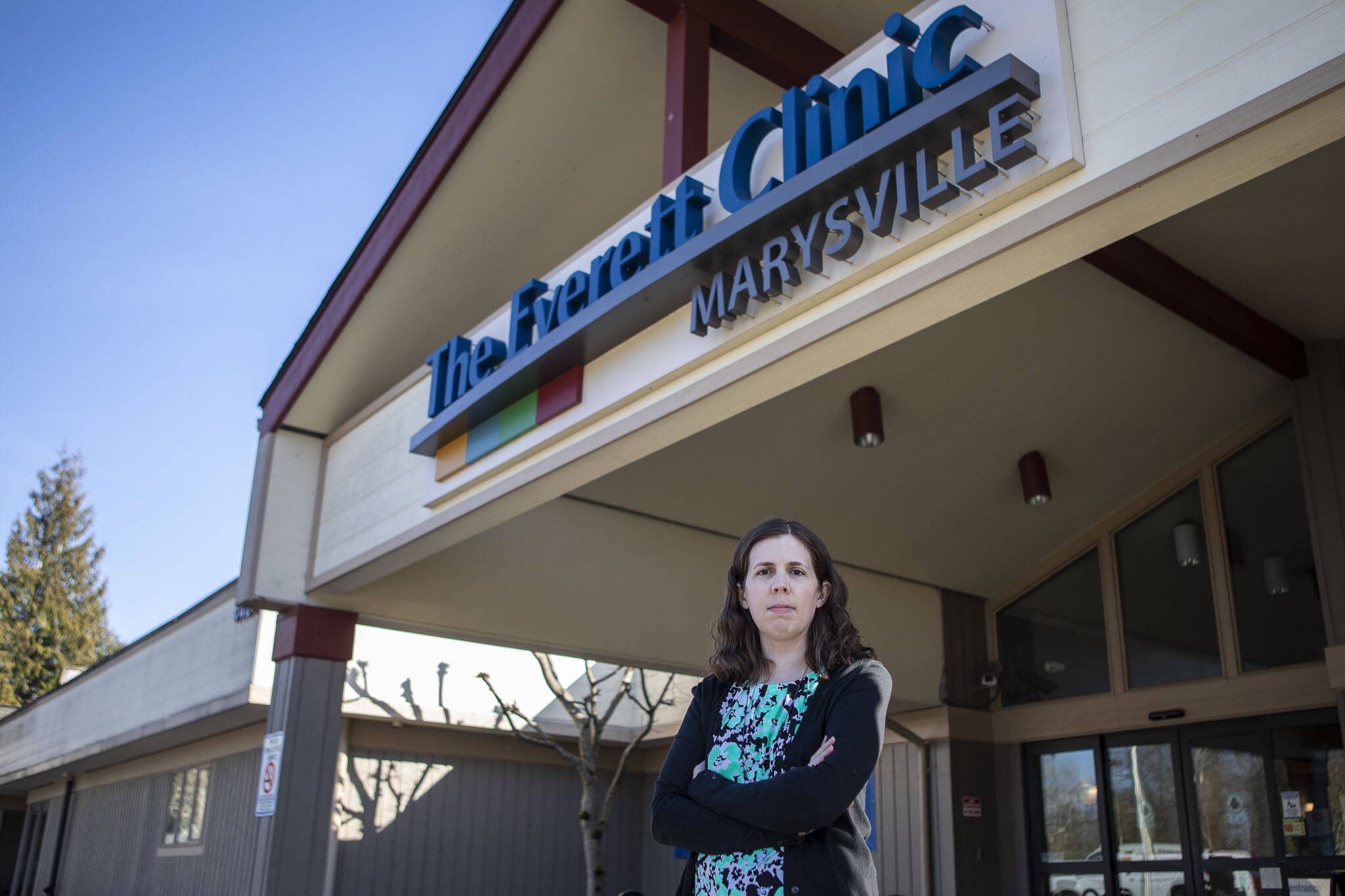MARYSVILLE — Kate Spencer is tired.
She’s tired of showing up to a doctor appointment and then finding out no American Sign Language interpreter is available, tired of taking time off of work again to reschedule, tired from the time and energy it takes to advocate for clinic staff to be trained on how to communicate with her and other Deaf or hard-of-hearing patients.
“That’s not my job,” Spencer said. “It’s exhausting. And I’m not able to prioritize my health.”
“Deaf” with a capital D signifies a specific group of people who share a culture and language, American Sign Language, while “deaf” with a lowercase d means the condition of not hearing, according to the National Association of the Deaf.
So far in 2023, Spencer has had two appointments at The Everett Clinic. When she showed up for her February annual eye exam, no interpreter was there. She had not received a phone call or a message over MyChart, the online provider portal. Frustrated because she had taken time off of work, she chose to attempt the appointment without an interpreter.
After about 30 minutes of slow back and forth about if and how to proceed, the staff did continue with the appointment. But they ran out of time. Imagine reading the letters on the wall during an eye exam, every time popping your head out of the equipment to write what you see, then reading the doctor’s next instructions.
She had to schedule a second appointment to complete the visit, leaving work early yet again. Yet again, no interpreter was there. This time, with her eyes dilated, reading and writing to communicate was incredibly difficult. The doctor repeatedly looked at her eye, then left the room and came back with a different device. The assistant took Spencer to a different room with special equipment that she was unfamiliar with after 25 years of eye exams.
“By this point, I was really struggling to read with my dilated eyes and was trying to remain calm but I felt a little panicked since this was unusual,” Spencer said. “I couldn’t help but have my mind immediately jump to the worst scenario, about there being something wrong with my eye health.”
Those 10 to 15 minutes, she said, “felt like forever.”
“I was trying my hardest to communicate and not panic that I might be told some bad news while being barely able to see the information.”
Thankfully, she said, the test came back normal and she got a clearer explanation afterward. An interpreter could have prevented the distress and allowed her to participate in her health care.
The Daily Herald interviewed Spencer and three others about the difficulties they have experienced at The Everett Clinic while Deaf.
‘I was very confused’
Nearly 26,000 people in Snohomish County are “deaf” or “have serious difficulty hearing” — about 40% of them are under age 65, according to U.S. Census estimates. Under federal law, medical providers must provide equal access to health care, which for deaf or Deaf patients means having a qualified in-person interpreter or, second best, video remote interpreting, known as VRI.
VRI can be used for speakers of many languages, not just ASL. The Everett Clinic does not have VRI.
Optum’s website provides general information about interpretation, but nothing about VRI services. Asked for comment on these specific access issues, Optum’s spokesperson, Karrie Spitzer, provided a statement:
“The Everett Clinic (TEC) strives to ensure that patients, regardless of their abilities, receive the best possible care and have equal opportunities to participate in our services. We adhere to the Americans with Disability Act (ADA) guidelines and work to identify and address barriers to care. We attempt to provide an ASL interpreter for scheduled visits, but there are times it is difficult to secure an in-person ASL interpreter.
“We value feedback and take patient complaints seriously. Supporting our patients with compassionate, quality care is our highest priority and we are actively working with the patient to address their concerns.
“Our patients, visitors and other interested parties can get in touch with us by emailing pnwfeedback@optumpnw.com.”
Spencer has been a patient at The Everett Clinic for 37 years. She has found that access to American Sign Language interpreters has noticeably worsened since Optum took over, as well as during the pandemic. In 2022, she documented seven out of 13 appointments that lacked a qualified in-person interpreter. And none of her four walk-in visits had an interpreter.
Lately, Spencer has resorted to writing on paper or just rescheduling. That is a frustrating outcome when she has rearranged her work schedule or when she has more urgent health care needs.
Not every Deaf or hard-of-hearing person speaks English, and it’s possible that they have other disabilities that limit their reading, writing and signing abilities. Access to an American Sign Language interpreter is vital for clear and effective communication with providers, Spencer said.
VRI is an alternative for when in-person interpreters are not available, maybe due to an urgent health care need. But specific standards must be met for it to work well, according to the U.S. Department of Justice: “dedicated high-speed, wide-bandwidth video connection or wireless connection that delivers high-quality video images that do not produce lags, choppy, blurry, or grainy images, or irregular pauses in communication.”
Spencer said in her research and experience, other area providers use VRI and have done so for years, including the University of Washington Medical Center, Swedish and Providence. She doesn’t understand why a huge company like Optum cannot afford to offer better interpretation services and VRI.
Spencer is not alone. Another patient, who requested anonymity to maintain his health privacy, said that compared to another provider, he experiences worse access to ASL interpretation services at The Everett Clinic.
When living in Seattle, he primarily visited University of Washington clinics and providers. After he moved to Marysville in 2009, he tried the closest option — The Everett Clinic. Until a few years ago, access to interpreters during appointments was usually good, he said.
But he started having challenges with interpretation access for more urgent primary care visits and for some specialty care. After learning that he had a serious gastrointestinal health condition, the specialist would only message him through MyChart, refusing to call with a telephone relay or video service.
“I was very confused when they explained what my GI diagnosis was through MyChart messages and I never met any GI doctor in person,” he wrote.
He gave up at The Everett Clinic and now drives 30 miles to the University of Washington for specialty care.
‘There would be an uproar’
Echo Greenlee, of Everett, runs a free website, deaffriendly.com, for the Deaf community to review and rate various services across the country, including medical care. Her paid work is consulting: advising businesses through trainings and assessments on how to improve access for Deaf and hard-of-hearing people.
Health care services, Greenlee said, probably get the most negative reviews on deaffriendly.com.
“There is no comparing getting take-out from a restaurant to having to visit the hospital and all that goes along with it,” she wrote. “All of us would probably agree that our health care experience is more critical than our experience dining out.”
She looked at Snohomish County reviews on behalf of The Herald, but the number was too small to make generalizations. She found seven negative reviews and one positive review of The Everett Clinic.
On health care generally, Greenlee said: “The most common complaints related to health care are lack of qualified in-person interpreters, the use of VRI in areas of the hospital where the internet connection is not good enough to support the bandwidth needed to support crisp video transmission, the lack of VRI altogether (as a backup to not having a live-interpreter) and providers’ reliance on VRI as the only solution.”
What can Deaf and hard-of-hearing patients do? They can complain, and try to provide guidance to providers about accommodation requests and the laws — something that is not their responsibility, Greenlee said. Spencer’s experience suggests that this is slow at best and non-responsive at worst.
This extra labor — with emotional, physical or even financial costs — has earned the name “disability tax.”
Spencer tried to push for some change in 2021, sending emails, making phone calls and even meeting in-person with The Everett Clinic’s patient access director. In 2022, she said, she still had no interpreter at 65% of her visits.
Another option is a lawsuit to enforce the Americans with Disabilities Act and other laws that protect and guarantee access to health care.
“Sadly, taking legal action is sometimes the only way to get your needs met,” Greenlee said. “This is why hospitals such as Northwest Hospital and Swedish Hospital in Seattle have been sued — and as a result have implemented policies and procedures that make their hospital more accessible to deaf and hard of hearing patients.”
In fact, last year Spencer and two other plaintiffs filed a class-action lawsuit against Providence St. Joseph Health and its affiliates over lack of “effective communication in violation of federal anti-discrimination laws.” The parties have been negotiating a settlement since soon after the plaintiffs filed the case.
Providence operates the two highest-volume acute care hospitals in Snohomish County. The Everett Clinic is often cited as one of the largest clinic providers in the county, though data on clinic market share is not publicly available as it is for hospitals.
After her second eye appointment, Spencer noticed a bill for it in her online insurance portal. Clinic staff had told her it wouldn’t be billed, she said. At the time this story was published, she was still waiting for resolution.
Spencer hoped that by coming forward change would happen.
“I am sharing my story because it needs to be told. If things were reversed with hearing people not having access, there would be an uproar to get it fixed immediately,” she said. “We deserve equal access to health care too.”
We will continue to report on access to health care. If you have faced barriers to accessing timely, convenient or affordable care in Snohomish County, please fill out this brief form: forms.gle/y5HH5zLpThkG1BXH7
Joy Borkholder: 425-339-3430; joy.borkholder@heraldnet.com; Twitter: @jlbinvestigates.
Talk to us
> Give us your news tips.
> Send us a letter to the editor.
> More Herald contact information.


























